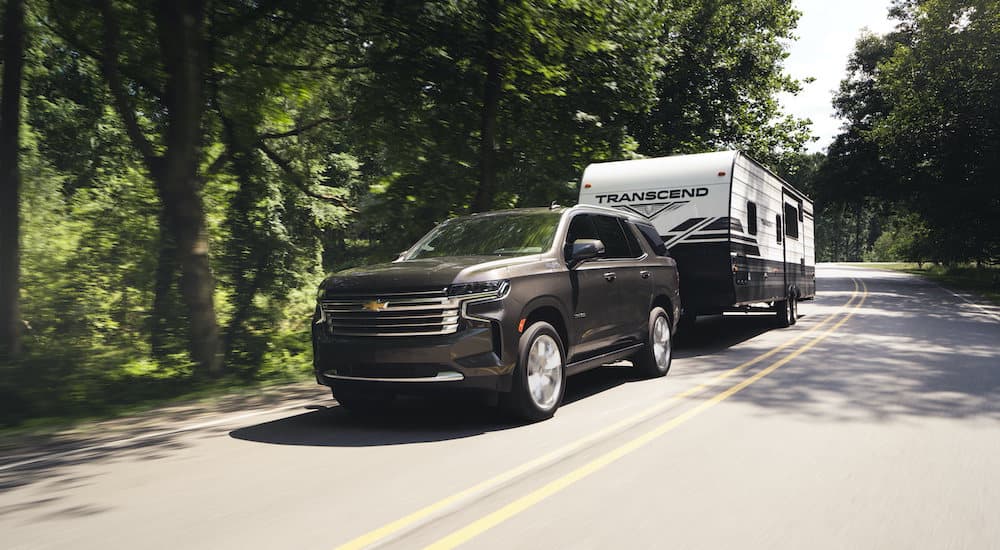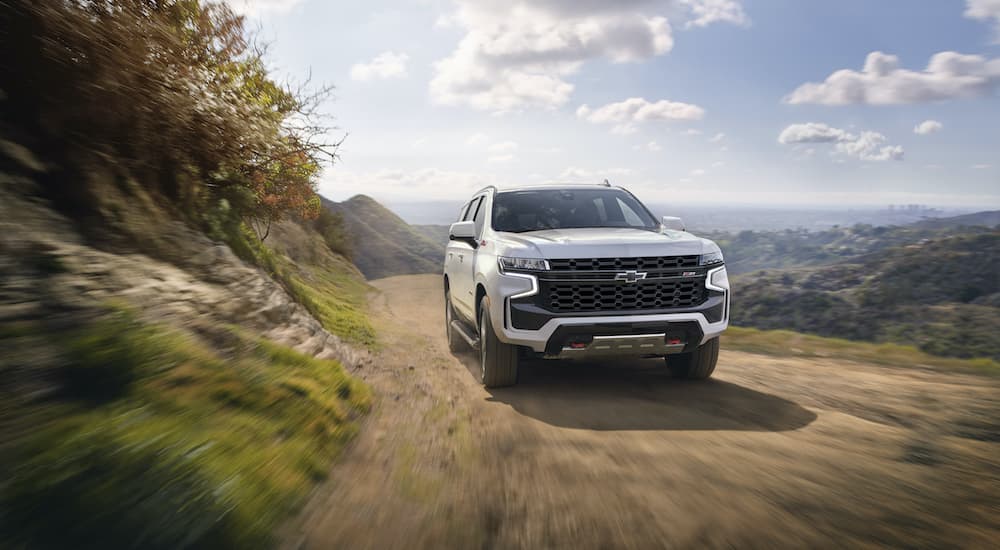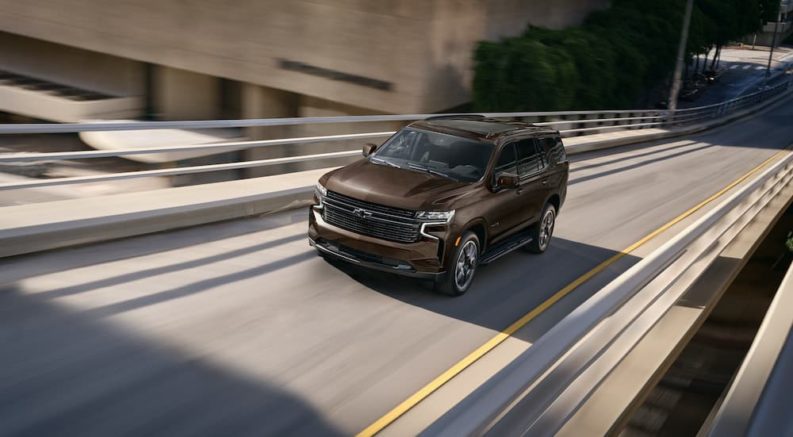15The Chevy Tahoe has remained one of the most popular large SUVs on the market for a number of reasons. Introduced in 1995, the Tahoe has stood the test of time thanks to its clever fusion of cargo and passenger room, power, and comfort, with its size usually standing out as its most exceptional feature. It’s this size that allows the 2022 Chevy Tahoe to serve any number of roles for a busy family, easily morphing from nine-passenger people-mover to off-roader or serving as a delivery vehicle for everything from refrigerators to kayaks. But the full-size SUV class brings its own set of challenges. Everything is bigger on the Tahoe, and with that comes the need for appropriately sized tires.
You wouldn’t run a marathon in flip-flops or scale a mountain in loafers, and your Tahoe is no different: if you’re expecting to achieve anything close to peak performance, you can’t neglect where the rubber meets the road. So what should you look for in a large SUV tire? How are they different from tires for smaller SUVs and other vehicles, and how often should you be changing them out? It’s time to get your Chevy Tahoe properly outfitted for the road ahead.
Why and When to Get New Tires
To be clear, there’s probably nothing wrong with the factory-installed all-season tires that came with your Tahoe. They were specifically chosen to fit the vehicle and stand up to the rigors of everyday use for the average driver. So why upgrade? There are a number of reasons, so let’s break them down.
First and most obvious: they’re simply worn out. While drivers of smaller cars and smaller SUVs might be able to get away with replacing tires less often, larger SUVs tend to chew through the rubber a little quicker due to their size and heavier use. While tread life varies by tire, road conditions, and driving style, experts recommend changing out your Tahoe tires every three to four years. It’s always better to stick to a regimented schedule than realize you’re in the market for a new set as you’re hydroplaning down the freeway. Nine percent of traffic accidents are tire-related, according to studies by the National Highway Traffic Safety Administration, so if you want to avoid becoming a statistic, keep an eye on that tread.
Gauging how much life is left in your tires is easy enough. The old quarter trick works well, but if you want the manufacturer’s opinion, just consult the tire’s Uniform Tire Quality Grade (UTQG) treadwear grade found on the side of the tire itself. These numbers usually range between 200 and 600, with a higher number indicating a longer service life. Take note of this number when shopping, as a seemingly good deal could last half as long as a more expensive option. Worn-out tires mean reduced braking and grip, and are an especially dangerous prospect in snowy or wet conditions. Speaking of which…
The second reason to reshoe the horse is if you know there is wet or snowy weather on the way. If you’re familiar with the smell of road salt in the morning, you know winter tires can be an indispensable tool in staying safe and in control during the winter months. Winter tires are actually exempt from UTQG testing as they’re purpose-built to offer maximum traction in specific temperatures (more on that later), but if you live in an area with very mild winters and don’t see yourself investing in a separate set of tires, the rating system can still give you a good idea of how they might perform in wet, cold conditions. The second element of the UTQG addresses traction and ranges from AA to C. Measured by how well a tire stops on a wet surface, this part of the UTQG should give you a good idea of your tire’s relative grip in slippery conditions.
Lastly, drivers might simply choose to switch out their tires depending on how their Tahoe is being used. As we mentioned earlier, this SUV is often cited for its versatility, easily shifting roles depending on what’s required. This can present some challenges for drivers since tires that might work best for say, towing, will not provide as smooth of a ride or last as long as some other options. Choosing the right tires for your Tahoe–or any vehicle–is something of a balancing act.
Tires have three distinct qualities–performance, comfort, and tread wear–that make them particularly well-suited to certain situations, but they often come at the cost of one another and might require drivers to make some tough decisions. Those trying to squeeze as much life out of the rubber as possible wouldn’t want to invest in some ultra-grippy racing tires, and vice versa, so before you start your hunt, try to envision what type of role you’re going to ask the Tahoe to play.
Best Tires For the Chevy Tahoe
We’ve broken down our 2022 Chevy Tahoe tire recommendations into four distinct categories: all-season, winter, highway, and all-terrain. Remember, in most cases, an all-season tire is going to perform just fine. These are a well-rounded option designed to balance out performance and tread wear life and should fit the needs of all but the most off-road bound or regularly trailer-hauling drivers. Also, while each model year and trim level differs, all 2022 Tahoes have wheels that measure between 18 and 22 inches in diameter. Consult your owner’s manual–or pull out a ruler–and size up your rims before starting your tire hunt.
Best All-Season Tahoe Tires
All-season touring tires are the most versatile option out there. Balancing grip and comfort with generous treadwear life, they’re likely the most practical option for the majority of drivers. These all-season tires easily provide the most comfortable ride out of the four categories listed here, with wide, soft sidewalls that do a good job absorbing the bumps in the road. They’re also some of the quietest options, which might not seem like the most important consideration until you’ve experienced the steady drone of some stiffer tires.
Top Pick:
- Continental CrossContact LX20 – A top pick in terms of comfort, these SUV-specific tires have another trick up their sleeve: improved fuel efficiency. Continental’s EcoPlus Technology decreases the tire’s rolling resistance, requiring less energy to move forward and resulting in savings at the pump.
- Michelin Latitude Tour HP – A premium option for those looking to improve the Tahoe’s handling and performance while retaining ride comfort, these Michelin tires are among the pricier options out there. The tires also feature the brand’s 2-D Active Sipes and FAZ Technology to improve performance in both dry and wet conditions.

Best Towing Tahoe Tires
Highway tires are designed to improve the Tahoe’s ability to tow large items at highway speeds. Built with stiff sidewalls and extra layers, these tires are more durable and better able to resist sway and the uneven wear patterns that can result from heavy-duty towing. The added high-speed stability will give you the confidence to navigate the highway no matter what you’ve got latched on the back, with increased responsiveness and traction ensuring a safer ride. They provide a fairly comfortable ride, but their heavier weight takes its toll on fuel economy and responsiveness.
These tires are largely classified by load range, with a lower alphabetical designation indicating a higher load rating. Load rating is an important factor that indicates the maximum weight a driver should tow on any given tire. Printed on the sidewall to the right of the tire’s diameter, compare this number against a tire load index (easily found online) to determine the maximum weight capacity of each tire. Multiply this number by four, and you have the Tahoe’s overall weight capacity.
Top picks:
- Michelin Defender LTX M/S – The Defender LTX M/S feature impressive high-speed stability due to their MaxTouch heavy-duty construction, which is always an important consideration when towing large loads. The tire’s EverTread compound prevents chipping, unlike many other highway tires, which means they can also be used on looser surfaces like dirt. They also go above and beyond in the warranty department, with 70,000 miles of guaranteed treadwear on most models.
- General Grabber HTS60 – A more affordable option in the highway category, these tires are Load E rated and are no slouch in the towing department. Speed rated up to 118 MPH with a 65,000-mile warranty; the Generals also include one feature not commonly found on highway tires: they’re resistant to chips and cuts, allowing them to be used on looser surfaces like gravel without worry. These tires have been lauded for their quiet performance, but critics also note that they’re not really up to snuff when facing heavy rains.
Best Off-Road Tahoe Tires
With an SUV as powerful and capable as the Tahoe, it’s a little hard to resist getting a little down and dirty at times. With all-terrain tires, you don’t have to. Designed for both on and off-road use, all-terrain tires max out on tread to provide improved grip in off-road scenarios. Perfect for use on rocks, dirt, and gravel, all-terrain tires still hold up well to everyday use, though they’re not as responsive and a whole lot louder. One added benefit: the deep tread patterns on all-terrain tires also allow them to perform well on snow, with some even rated for severe winter driving. If you need winter tires for your Tahoe, all-terrains are the best place to start looking.
Top picks:
- Goodyear Wrangler All-Terrain Adventure – A prime example of the well-rounded benefits of all-terrain tires, the Goodyear Wrangler is at home on pretty much any surface you can imagine: dirt, rocks, snow, and loose gravel. Added bonus, they feature the three-peak mountain snowflake (3PMSF) symbol that indicates they can be used in severe winter weather, including ice. Like many all-terrain tires, they’re not the quietest out there, but the class-leading 60,000-mile treadwear warranty softens the blow a bit.
- BFGoodrich Mud-Terrain T/A KM3 – Much more purpose-built than the Goodyears, these BFGoodrich tires are designed to play in the mud. They’re sure to be a hit among off-road enthusiasts but are decidedly not an ideal solution for everyday driving. The same deep treads and thick sidewalls that make the BFGoodrich tires so good at tearing through loose rocks, mud, and dirt also mean they’re loud and inefficient on hard surfaces and at higher speeds. The tires are perfect for turning your Tahoe into a dedicated off-road beast but aren’t well-suited for snow and ice.

Find Tires That Work for Your Tahoe
The Chevy Tahoe is an adventure waiting to happen, but without the right tires, you could be in for a bumpy road. Remember to consider how you’ll primarily be using your Tahoe before investing in a new set and decide how important grip, comfort, and longevity are to your driving experience. In some cases, being outfitted with the correct set of tires might be more of a safety issue–winter tires, for example–but more often than not, it comes down to a matter of preference. The added traction offered by all-terrain tires is great and all, but if it means your neighbors can hear your tires biting into the asphalt from a block away, it might not be worthwhile.
Ultimately tires are a tool and ones that must be regularly maintained and inspected if you expect to get the best out of them. The right tires for the job can go a long way, but be mindful about keeping them properly inflated and check for any knicks or punctures that could result in the dreaded blow-out. When properly outfitted, the Chevy Tahoe is one of the most exciting, dynamic vehicles on the road, and it all starts with those four tires.

